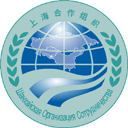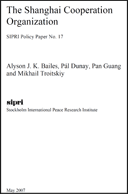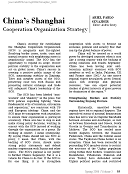The SCO institutions consist of two parts: the meeting mechanism and the permanent organs.
Council of Heads of State
It is the highest SCO organ. Its main functions are: to identify priority areas and basic directions of SCO activities; to determine matters of principle concerning SCO internal set-up and operation; to decide on matters of principle of SCO cooperation with other countries and international organizations; and to study pressing international issues.
Regular sessions of the Council of Heads of State are held once a year in member states alternately according to the Russian alphabetical order of the country names. The host country of the session of the Council of Heads of State assumes the rotating presidency of the organization. Uzbekistanis the current state of presidency.
Council of Heads of Government
Its main functions are: to adopt SCO budgets; to study and determine the principal matters of cooperation in specific areas within the SCO framework, especially in the economic field. Regular sessions of the Council of Heads of Government are held once a year.
Council of Ministers of Foreign Affairs
Its main functions are: to study and resolve major issues of current SCO activities, including preparing for the meeting of the Council of Heads of State, implementing SCO decisions, and holding consultations on international issues. Regular sessions of the Council of Ministers of Foreign Affairs are arranged to take place one month before the regular meeting of the Council of Heads of State. The Minister of Foreign Affairs of the host country of the meeting of the Council of Heads of State serves as chairman of the meeting of the Council of Ministers of Foreign Affairs and may conduct external relations on behalf of the SCO.
Conference of Heads of Agencies
Its main function is to study and resolve specific questions of cooperation in specialized areas. At present, the meeting mechanism has been established for attorneys general (procurators general), and ministers of defense, the economy, commerce, transportation and culture as well as heads of law-enforcement, security, emergency and disaster-relief agencies.
Council of National Coordinators
It is a coordinator and management organ of SCO routine activities. It meets at least three times a year. Its chairman is the National Coordinator of the host country of the meeting of the Council of Heads of State and may represent the SCO externally subject to authorization by the chairman of the Council of Ministers of Foreign Affairs.
Secretariat
As SCO’s standing executive organ, the Secretariat is based in Beijing and will be officially launched in January 2004. Its main functions are: to provide organizational and technical support for SCO activities, to participate in the study and implementation of SCO documents, and to put forward suggestions for SCO annual budget-making. The Executive Secretary is appointed by the Council of Heads of State. Member states take turns according to the Russian alphabetical order of their country names to serve a non-consecutive three-year term. The first Executive Secretary is Mr. Zhang Deguang (Chinese citizen).
Regional Anti-Terrorism Structure (RATS)
This is a SCO permanent organ based inTashkent, capital of Uzbekistan. It was officially launched in January 2004. Its main function is to coordinate SCO member activities against terrorism, separatism and extremism. The RATS is composed of the Council and the Executive Committee. The Council, a decision-making and leading body of RATS, is composed of leading officials of the competent authorities of the member states. Director of the Executive Committee, which is RATS’ routine executive body, is appointed by the Council of Heads of State. The first director of the Executive Committee is Casymov. V.T. (Uzbek citizen).



